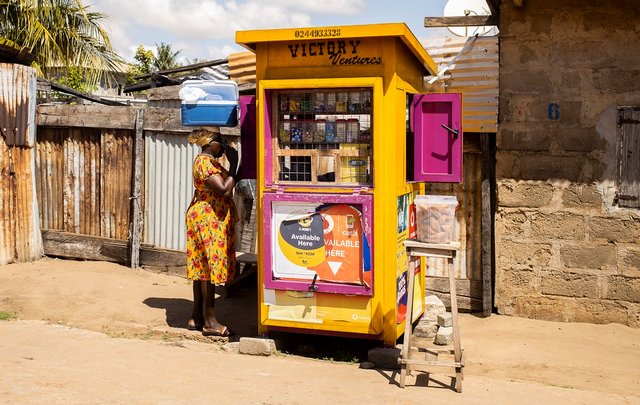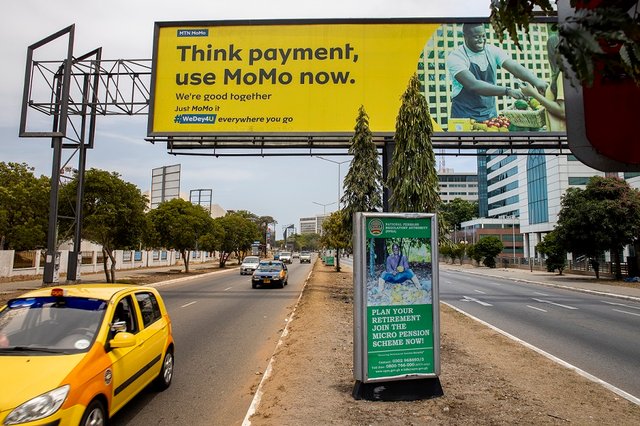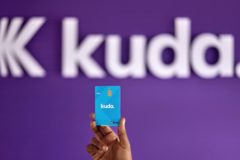It’s becoming increasingly popular to store money in an electronic wallet in Benin Republic. Years of growth in mobile money adoption among Beninese saw the penetration of active wallets reach 37% of the population in 2019, according to a report by the Central Bank of West African States (BCEAO), from only 9% five years earlier.
The surge in mobile money uptake in the West African nation isn’t due only to the convenience such a solution offers but stems also from necessity.
Back in 2016, Denise Amadou, an apparel retailer based in Cotonou, had to travel at least twice a week to make wholesale purchases in northern Benin, with cash stashed in her bag to pay suppliers, the majority of who didn’t have bank accounts. In addition to going through the hassle and security risks cash poses, her profits dipped as her customers in the capital city had to shop elsewhere during her frequent absences.
Now, Amadou places her orders via online channels and pays suppliers who send the wares upon receiving payments via mobile money wallets provided by MTN Mobile Money.
“My business has grown massively,” she told TechCabal on a call. “Since I started using my phone to pay suppliers, and even repay my bank loans, I’ve been able to save a lot of time and money.”
Like other developing countries in Africa, Benin has always had the right market conditions for a mobile money industry to thrive; it is home to a population with limited access to financial services but actively uses mobile phones.
Although mobile money debuted in the country in 2010, the market did not fully take off until 2017, two years after the BCEAO—the common apex bank for the eight francophone West African countries—introduced new regulations that allowed mobile network operators to take up e-money issuer (EMI) licenses.
Mobile money adoption has expanded ever since with MTN, through its mobile money subsidiary, dominating the market. It has so far been the only telco granted an EMI license and has successfully built on its existing infrastructure to offer basic financial services to individual and enterprise subscribers.
“We have played a major role in digital finance usage and empowered our customers in Benin by building a strong ecosystem of innovative and adapted solutions,” Serge Soglo, the managing director of MTN Mobile Money Benin S.A. tells TechCabal.
What is fueling the growth?
One of the key drivers of mobile money is that the know-your-customer (KYC) requirements are less exacting than those for opening a typical bank account.
That has enabled many Beninese—mainly rural-based and in need of innovative financial services—easily sign up for wallets. In 2019, there were more than 11 million registered mobile money accounts in Benin, per a BCEAO report, compared to less than two million bank accounts.
MTN’s mobile money product, MoMo, has seen significant growth amid the boom. At the end of July, active customers stood at three million, representing a quarter of the entire population, while monthly transactions averaged 60 million, valued at 400 billion FCFA ($709 million).
“Apart from the hunger for financial services among the people, the environment we operate is enabling and this has been a major driver,” Soglo explains. “There is a strong digital access agenda initiated by the government in the country and financial inclusion is one of the key pillars.”
MTN has also invested significantly in extending its agent network and in the rollout of several digital finance products. MoMo adoption is driven by a strong network of more than 60,000 agents, translating to one service point for just less than 50 active customers.
Broadly, human-agent networks have been key to deepening mobile money among Beninese, as they provide greater proximity to financial services outside the capital city. In 2015, there were only 10 active agents per 100,000 adults. By June 2019, that figure had risen to 649, according to a MasterCard report.
Agents are an important link in the value chain, being in direct contact with and educating customers. According to Soglo, one of the key learnings for MTN Mobile Money in Benin has been the importance of education in driving penetration and building consumer trust.
“Showing and teaching people how to use the services through all available channels, including using local languages, makes a huge difference in ensuring adoption,” he says. “This is not a one-off approach so we put a lot of effort into educating our customers.”

Partnerships among network operators and financial institutions have enabled mobile money players to offer secondary services, such as pension and insurance, on top existing platforms. MTN MoMo recently launched an affordable micro-life insurance service in partnership with NSIA Vie, SUNU Assurance Vie, and Azur Courtage S.A. The product, available from 25 FCFA (45 cents) a month, allows users to easily subscribe, file a claim, and receive payments.
In 2018, ALIDé, a microfinance institution, launched a new service that allowed borrowers to repay their loans via phone, by connecting the company’s backend information system to MTN’s mobile money platform.
Thousands of small entrepreneurs like Amadou in Benin today use the bank-to-wallet service by ALIDé and MTN to borrow and pay back their loans.
Digital finance driving inclusion
Benin has performed well in recent years in terms of financial inclusion. According to a report by the BCEAO, the country had one of the highest financial inclusion rates in the West African Economic and Monetary Union (WAEMU) zone in 2018.
Mobile money drives the bulk of financial access across all segments of the population, bridging gaps for unbanked people that the existing banking sector cannot.
Soglo sees collaboration between telcos, banks, and emerging fintech startups as crucial to further deepening the penetration of mobile money and digital finance and closing Benin Republic’s existing financial inclusion gap.
“We believe in partnerships to build platforms,” he says. “Partnerships are essential to enable the technology that in turn empowers people to manage money and time in their daily lives.”
Alongside francophone Africa neighbours, Senegal and Ivory Coast, Benin is one of the fastest-growing markets when it comes to digital financial services. Yet there is still an opportunity for providers to expand in the country, where only around 20% of adults have a bank account.
Opportunities for growth exist in communities where there’s a high percentage of households with access to mobile phones but still a low number of financial access points. In addition, the ecosystem of merchants that accept digital payments remains underdeveloped, a United Nations report found.
Prospects are bright. For one, the Beninese government has shown a commitment to creating an environment that encourages innovation in digital financial services. The state is currently deploying a plan for all Beninese to get the national card—the Personal Identification Certificate (CIP)—which could potentially solve the challenge of valid identification documents necessary for creating mobile money accounts.
“MTN aims to be a key player in the state’s agenda relative to financial inclusion and really have to thank the government for enabling an environment that fosters inclusion,” Soglo says. “Mobile money is, for us, a way to achieve that and we will continue to focus on bringing more people on board.”
If you enjoyed reading this article, please share it in your WhatsApp groups and Telegram channels.





















